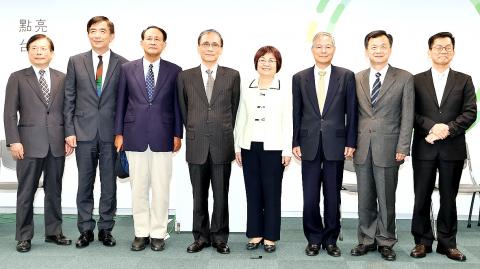The Democratic Progressive Party (DPP) yesterday announced additional future Cabinet members after introducing the first eight names on Thursday, with Tainan City Government secretary-general Chen Mei-ling (陳美伶) named as future Executive Yuan secretary-general and former Taoyuan deputy mayor Chiu Tai-san (邱太三) named as future minister of justice.
Chiu said the request came from president-elect Tsai Ing-wen (蔡英文).
National Taiwan University professor Chen Tain-jy (陳添枝) has been asked to head the National Development Council, with Kung Ming-hsin (龔明鑫), Tsai’s industrial policy convener, asked to serve as Chen Tain-jy’s deputy, premier-designate Lin Chuan (林全) announced yesterday afternoon.

Photo: Chu Pei-hsung, Taipei Times
Deputy Minister of Labor Kuo Fan-yu (郭芳煜) has been tapped for the ministry’s position and National Chung Hsing University professor Chen Chi-chung (陳吉仲) has been tapped as deputy minister of the Council of Agriculture, while former Pingtung County commissioner Tsao Chi-hung (曹啟鴻) has been asked to serve as minister of agriculture, Lin said.
Lin later said in a radio interview that Tsao accepted the appointment.
DPP Legislator-at-large Lee Ying-yuan (李應元) has been appointed as the Environmental Protection Agency director, while lawyer and environmental activist Thomas Chan (詹順貴) is to serve as his deputy, Lin added.
Lin also tapped DPP Legislator-at-large Cheng Li-chun (鄭麗君) for minister of culture, with Cheng saying that she was considering the offer.
Kaohsiung Deputy Mayor Wu Hong-mo (吳宏謀) has been asked to head the Executive Yuan’s public construction commission, Lin said.
Meanwhile, sources said that Chen Mei-ling’s appointment as Executive Yuan secretary-general did not come as a surprise due to her capabilities and experience in the administrative branch.
Chen Mei-ling served as the Executive Yuan deputy secretary-general during former president Chen Shui-bian’s (陳水扁) administration and shared a cordial relationship with Tsai, the sources said, adding that with such a background, it was no surprise that Chen Mei-ling would be tapped to be a part of the central government.
Chen Mei-ling’s influence in Tainan can be seen from her nickname, “Shadow Mayor,” the sources said.
They also said that Chen Mei-ling’s assistance was notable for the success of Tainan Mayor William Lai (賴清德), who had no prior experience in politics, adding that with Chen Mei-ling’s transfer to the central government, her vacancy in the city government would be hard to fill.

Intelligence agents have recorded 510,000 instances of “controversial information” being spread online by the Chinese Communist Party (CCP) so far this year, the National Security Bureau (NSB) said in a report yesterday, as it warned of artificial intelligence (AI) being employed to generate destabilizing misinformation. The bureau submitted a written report to the Legislative Yuan in preparation for National Security Bureau Director-General Tsai Ming-yen’s (蔡明彥) appearance before the Foreign Affairs and National Defense Committee today. The CCP has been using cognitive warfare to divide Taiwanese society by commenting on controversial issues such as Taiwan Semiconductor Manufacturing Co’s (TSMC, 台積電) investments in the

INVESTIGATION: The case is the latest instance of a DPP figure being implicated in an espionage network accused of allegedly leaking information to Chinese intelligence Democratic Progressive Party (DPP) member Ho Jen-chieh (何仁傑) was detained and held incommunicado yesterday on suspicion of spying for China during his tenure as assistant to then-minister of foreign affairs Joseph Wu (吳釗燮). The Taipei District Prosecutors’ Office said Ho was implicated during its investigation into alleged spying activities by former Presidential Office consultant Wu Shang-yu (吳尚雨). Prosecutors said there is reason to believe Ho breached the National Security Act (國家安全法) by leaking classified Ministry of Foreign Affairs information to Chinese intelligence. Following interrogation, prosecutors petitioned the Taipei District Court to detain Ho, citing concerns over potential collusion or tampering of evidence. The

‘COMPREHENSIVE PLAN’: Lin Chia-lung said that the government was ready to talk about a variety of issues, including investment in and purchases from the US The National Stabilization Fund (NSF) yesterday announced that it would step in to staunch stock market losses for the ninth time in the nation’s history. An NSF board meeting, originally scheduled for Monday next week, was moved to yesterday after stocks plummeted in the wake of US President Donald Trump’s announcement of 32 percent tariffs on Taiwan on Wednesday last week. Board members voted to support the stock market with the NT$500 billion (US$15.15 billion) fund, with injections of funds to begin as soon as today. The NSF in 2000 injected NT$120 billion to stabilize stocks, the most ever. The lowest amount it

NEGOTIATIONS: Taiwan has good relations with Washington and the outlook for the negotiations looks promising, Minister of Economic Affairs J.W. Kuo said Taiwan’s GDP growth this year is expected to decrease by 0.43 to 1.61 percentage points due to the effects of US tariffs, National Development Council (NDC) Minister Paul Liu (劉鏡清) said at a meeting of the legislature’s Economics Committee in Taipei yesterday, citing a preliminary estimate by a private research institution. Taiwan’s economy would be significantly affected by the 32 percent “reciprocal” tariffs slapped by the US, which took effect yesterday, Liu said, adding that GDP growth could fall below 3 percent and potentially even dip below 2 percent to 1.53 percent this year. The council has commissioned another institution